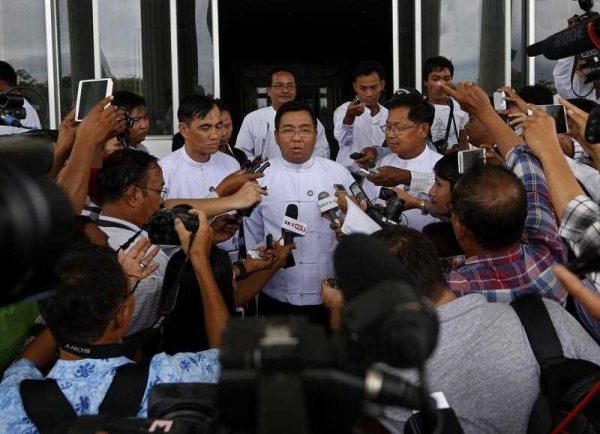Myanmar’s Union Election Commission (UEC) is scheduled to hold the 2015 election in November. But citizens can anticipate a very high risk of electoral corruption, vote rigging and changing, regulation manipulation, voter intimidation, ballot box stuffing, electoral malfeasance and electoral fraud. If the 2015 election is to be characterised by integrity and accountability, Myanmar must mitigate the risk of election corruption.
Elections in Myanmar have become a moneymaking industry, instead of one that focuses on improving the quality of elected public officials. The problem is that cronies-turned-politicians are gaining power with financial and monetary assistance. Only two politicians have asserted that government policy must tackle corruption — Opposition Leader Aung San Suu Kyi and Speaker of the Upper House Khin Aung Myint. But the majority of members of parliament are not accountable and accessible to the people, as they have been handpicked by corrupt elections. The election system itself is corrupt; Myanmar cannot expect self-respect, ethics and integrity from the candidates and politicians chosen by the system.
There have been few debates on national strategy and policy priorities regarding election corruption. Instead, political parties and opportunistic politicians have been approaching cronies for financing, and playing the religion card — a questionable action in a secular democracy.
Worldwide, there are a number of anti-corruption techniques to manage electoral corruption and fraud, and Myanmar’s authorities should use them to effectively respond to electoral corruption.
Myanmar needs to introduce a leadership code package, which would use regulation to prevent the abuse of public power. Contenders and candidates would need to be elected in transparent and accountable ways. The code should be based on a social contract between the ruler and the ruled. If there is a responsive leadership code, the people will not be forced to sacrifice their rights to rulers who claim that they are the country’s leaders.
Myanmar needs to improve the quality of rule of law and to increase the integrity of the UEC. The legal and technical systems of the UEC should be reliable and respected. As of 2015, the people are losing trust and confidence in the UEC due to Myanmar’s flawed legal and judicial system. Myanmar must reinvent the UEC as an organisation that respects civilians, business leaders and non-military personnel. The legal system, and the rules and regulations of the UEC, must have higher standards of morality and integrity. They have to be trustworthy in the eyes of both the citizenry and the international community.
The revenue and expenditure aspects of campaign financing must also be regulated transparently. As it currently stands, Myanmar’s political financers and donors can purchase votes and influence voters. Political party revenues must be declared; and corporate, foreign and anonymous funding for elections must be limited, if not outlawed. Candidates should be required to record their expenditure, including advertising, personal expenses and the quantity of election money used. Candidates and donors should declare all payments, names and addresses to increase transparency. Also, independent external audits must examine candidates’ expenditure and revenue as well as political parties’ financing and funds. The UEC must disclose election funding for all contenders and elected candidates to the country.
The UEC should further enhance the integrity and impartiality of the 2015 election by inviting international election monitoring teams and observers (such as the UN Electoral Assistance Division) to observe all processes of the election. Installing an impartial election monitoring system will provide a tool for managing electoral fraud and corruption in Myanmar. They should invite observers and advisory missions from market democracies who have the technical expertise, know-how and experience. They can help ensure impartiality in election process, including voter registration, rules and regulation, voter education and fairness of campaign financing.
Finally, independent media (particularly research-oriented press and investigative journalism) should be encouraged as an effective anti-corruption measure. Myanmar’s media can play a key role in monitoring and educating the public about electoral corruption. They can then investigate cases of corrupt officials and election fraud.
Election corruption in Myanmar is neither a demand–supply problem nor a principal–agent problem. It is a triangle of corruption between political parties, contenders and their cronies and funders. But there are a number of ways to reduce the high rates of electoral corruption in Myanmar. To ensure integrity and accountability for the 2015 election, Myanmar needs to introduce a smart regulatory framework with adequate legal enforcement that ensures all stakeholders must play by the rules.
Naing Ko Ko is a PhD Scholar at the Regulatory Institutions Network at the College of Asia and the Pacific, The Australian National University.

